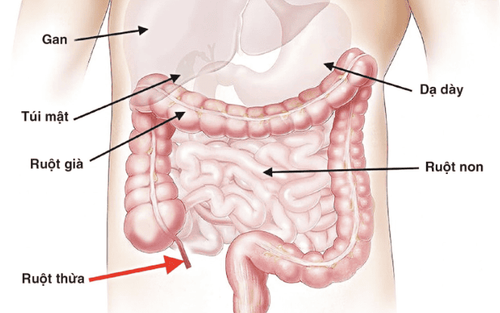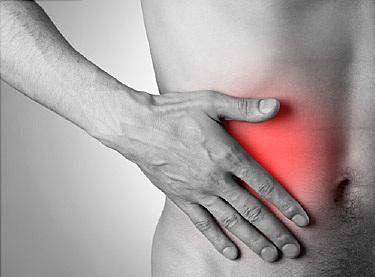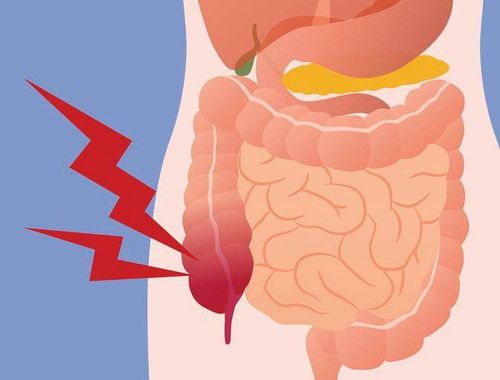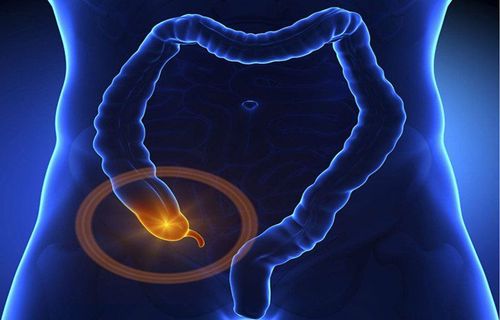This is an automatically translated article.
The article is professionally consulted by Doctor Department of Medical Examination & Internal Medicine - Vinmec Hai Phong International General Hospital.
Appendicitis is a fairly common disease that can occur at any age. If the disease is not detected early for treatment, it is easy to cause dangerous complications, even life-threatening.
1. What is appendix?
The appendix is an internal organ that is 3 to 13 cm long. The appendix is caused by a degeneration of the first part of the cecum, attached to the cecum end of the large intestine, about 2-3cm below the ileocecal angle (the angle formed by the cecum and ileum of the small intestine). The appendix has its origin at the confluence of three longitudinal muscle bands in the large intestine, the midpoint of the line connecting the anterior superior iliac spine and the umbilicus (1/3 lateral and 2/3 medial).
According to research, the appendix has a certain, even very important role in the digestive system. Because, in the digestive tract system, there is a group of beneficial bacteria that live symbiotically and play an essential role in the fermentation of food, synthesis of vitamins... and observed, the number of microorganisms found This bacteria will gradually decrease from the appendix onwards.
Thus, the appendix is a reservoir of beneficial bacteria for the digestive system. In particular, in the case of severe diarrhea and antibiotic use, the digestive system "lost" a large amount of beneficial bacteria, the "support" from the appendix is extremely necessary to reestablish the bacterial flora. intestinal tract, avoiding harmful bacteria taking advantage of invasion. The wall of the appendix contains lymphatic tissue, which is part of the immune system that produces antibodies.

2. What is appendicitis?
Appendicitis is an inflammation of the appendix due to a blockage in the opening between the appendix and the cecum. One of the causes of appendicitis is an accumulation of mucus in the lumen of the appendix or the passage of feces from the cecum into the appendix.
After a while, the mucus and stools become hard, solid and cause blockage of the opening causing acute inflammation. Stone-hard stools located in the lumen of the appendix are called "fecal stones" (fecal matter the size of a pea, hard and calcified causing obstruction of the opening between the appendix and the cecum).
Appendicitis can also be caused by swelling of the lymphatic tissue of the appendix and obstruction of the appendix. After this obstruction occurs, bacteria that normally reside in the lumen of the appendix begin to invade the wall of the appendix. The body again responds to this invasion by attacking the bacteria. The phenomenon of attacking those bacteria is called inflammation. Many cases of appendicitis are caused by intestinal worms (pinworms, roundworms...). Worms enter the appendix carrying loads of intestinal bacteria and cause acute inflammation.
Acute appendicitis is very easy to spread from the lumen to the wall of the appendix and is very susceptible to rupture (appendiceal perforation). If the appendix is ruptured, bacteria will quickly grow and spread, causing acute infection of the entire abdomen, in which the most feared is peritonitis (peritoneum).
Most cases of appendicitis are localized to a small area around the appendix called a periappendiceal abscess. In some cases, when appendicitis, antibiotics were used in the first place for many different reasons (not known as appendicitis, suspected but not able to go to the hospital right away because of the long distance, due to the hostilities). disregard...) so the inflammation has not spread into the abdomen or is broken but is covered by the surrounding organs, especially the peritoneum, which can become a clump of the appendix, later go to a new doctor. found to have appendicitis and will be treated aggressively to avoid possible dangerous complications.
3. Dangerous complications

3.1.Generalized peritonitis
The most common complication is total peritonitis due to an inflamed and ruptured appendix (perforation) flowing into the abdomen, the patient will have an infection and toxic syndrome (high fever, chills, tachycardia, blood pressure). Falling back, bowel obstruction, abdominal distention due to paralytic ileus, abdominal wall reaction is very typical (touching any position of the abdomen feels painful) This is the most serious complication caused by appendicitis if not detected early. and if not treated in time, the patient's life will be threatened due to toxic infection
At the time before 36 hours since the first symptoms (right iliac fossa pain, low fever, nausea, vomiting) ...) is present, the risk of appendicitis perforation is as low as 15%. Therefore, once appendicitis is diagnosed, surgery should be performed, avoiding unnecessary delays.
3.2.Appendiceal abscess
If the appendix is inflamed and ruptured but has not yet spilled into the abdomen, thanks to the omentum and surrounding loops, the inflammation is localized and does not spread to the abdomen to form an appendix abscess. At this time, the patient still has pain in the right iliac fossa and has a high or very high fever. On examination of the right iliac fossa, there was a non-motile mass with tenderness and tenderness. If the white blood cell test will be elevated. This case is not handled properly, the abscess can burst into the abdomen causing peritonitis like the case just described above, it will be less dangerous if the abscess breaks out.
3.3.Appendices clumps
If the resistance is good and the adhesion of the bowel loop and mesentery is good, it can become a mass of the appendix. In this case, the clinical manifestations of fever and pain may be reduced and the right iliac fossa will appear as a firm, non-movable mass with mild tenderness. If blood tests can show that the white blood cells are not as high as they were at the beginning, even normal. The mass can also progress in two directions or dissolve or form an appendix abscess.
Vinmec International General Hospital is one of the hospitals that not only ensures professional quality with a team of doctors, modern equipment and technology, but also stands out for its examination, consulting and service services. comprehensive and professional medical treatment; civilized, polite, safe and sterile medical examination and treatment space.
Customers can directly go to Vinmec Health system nationwide to visit or contact the hotline here for support.













